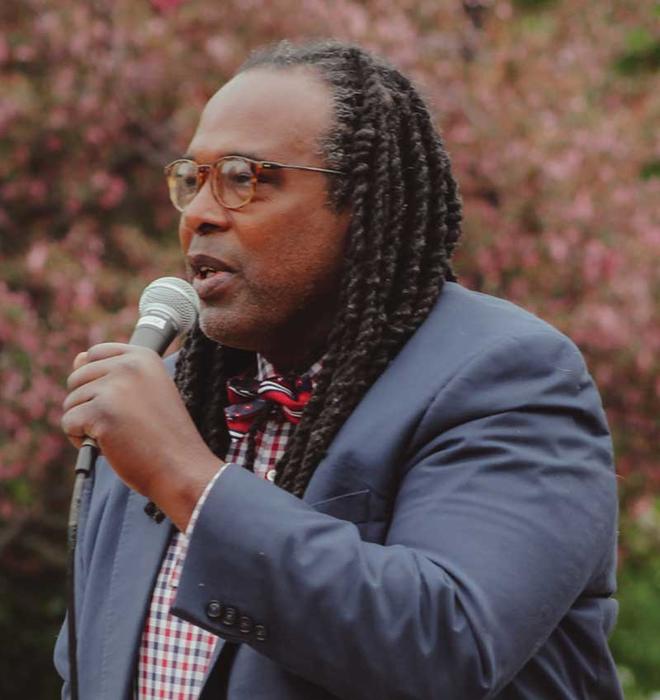
December 17, 1959 –
June 19, 2021
When an off-duty St. Louis police officer fatally shot VonDerrit Myers Jr., an 18-year-old Black man, in October 2014, students at Saint Louis University reacted swiftly, occupying the school’s signature clock tower in a protest in pursuit of racial justice. At the time of the shooting, the community was still reeling from the unrest that followed the death of Michael Brown, killed by a police officer that August in the nearby town of Ferguson, Missouri. Myers’ death was even closer to home for the SLU community: It happened in the Shaw neighborhood that borders the campus, and Myers’ father had been an SLU employee.
During their protests, the students found a sincere advocate among the university’s faculty. Jonathan Smith ’81, a professor of American studies and African American studies at SLU, took the initiative to meet with the students informally, talking with them about their goals for the protest while also making sure that they had water, blankets, and other essentials. For Smith, who died on Juneteenth after experiencing a stroke 11 days earlier, the experience in some ways marked a full-circle journey. In 1978, he was among the dozens of students who occupied Nassau Hall to demand that Princeton University divest from South Africa.
“That’s what I did for four years [at Princeton], often to the detriment of my studies — picketing,” Smith told SLU’s Universitas magazine. “During the spring semester of my freshman year at Princeton University, we picketed behind the administration building every day. I was out there, rain, shine, snow.”
“I loved to hear him when he talked about that time at Princeton University, because here he is — the son of a civil-rights leader, somebody who worked in the civil-rights movement,” said his brother, Jacques Smith ’93. “He was so excited to tell his father that he had been a part of that sit-in. He used to tell me this: ‘I called Dad and I was, like, guess what we did! We sat in last night and it ended up on the news!’ And my father was, like, ‘I sent you there to graduate.’”
While Princeton did not start to divest from South Africa until 1986, five years after Smith graduated, his advocacy on behalf of the SLU student protesters achieved results more swiftly. Following six days of peaceful protests, the students and SLU agreed to the Clock Tower Accords, which called for the school to take 13 steps to improve racial equity in the community, such as increasing financial aid for the retention of Black students, creating college-prep workshops for socioeconomically disadvantaged high school students in the region, and sponsoring a national conference on racial equity. The accords also called for creation of the position of special assistant to the president for diversity and community engagement. Smith was hired for that role in 2017, a job he filled until his death.
Smith told Universitas that ongoing dialogue between students and administrators is essential to create meaningful, lasting change on matters of racial equity. “I think the role of young people has always been to introduce the fierce urgency of now,” he said. “I think the role of those of us in leadership is to secure change in a way that’s transformational. And I think that for structures to be transformed and for progress to be real, we always need those two things in action with each other.”
Smith was on the advisory board of the St. Louis Public Radio Friends of KWMU, where he led the group’s diversity, equity, and inclusion work. He was president of the St. Louis Black Rep, which performed a show based on a collection of poems he wrote called “Do I Move You?”
Smith described his lifelong efforts to fight racism as merely doing his part to help his communities.
“I didn’t think of it as leadership,” he said. “I just thought of it as what I could do.”
Journalist Kenneth Terrell ’93 is a writer and editor for AARP.
In 2016, Jonathan Smith ’81 gave this talk titled “Faith and My Father” at St. Louis University:






1 Response
Cristina Traina ’83
4 Years AgoAlways a Teacher
Thank you for the exquisite memorials in the February issue. The essay on Jonathan Smith ’81’s inspiring teaching and leadership struck me particularly deeply.
Jonathan was my first-year RA in 1901 Hall. When this very naive, very white poetry fan asked whether I could attend a meeting of his poetry group, Kuumba, he invited me along. I worked and performed with the group during that whole year.
Thanks to Jonathan, poems like Gil Scott-Heron’s “The Revolution Will Not Be Televised” are now a visceral part of me. Thanks to Kuumba members’ nonjudgmental welcome, I became gradually aware — without their telling me directly — how toxic Princeton often was for them and how much they needed times and spaces of retreat from white students. The next fall I knew I couldn’t and shouldn’t return to the group. Any boundary-breaking from me would have to take other forms.
None of them owed me this education, which was costly to them, and which I should not have needed. But thanks to Jonathan’s quiet example, they gently taught me, nevertheless. I am grateful to them all.